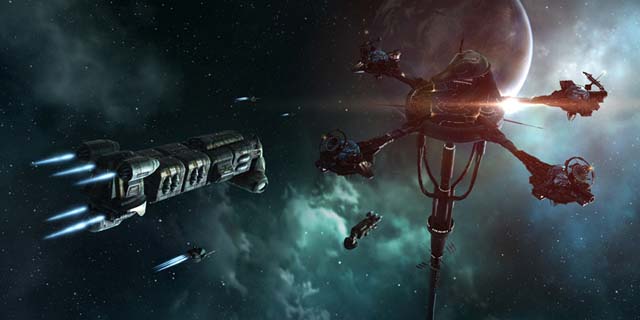
One of the biggest aspects of the MMO genre is the in-game economy. It is inevitable, when you create a persistent world populated by players, that eventually they will want to trade with each other. And, like the real world, different players hold themselves to a different code of ethics when participating in trade. Much like the government of a real-world nation, the game’s developer finds themselves having to restrict and encourage their players to provide fairness and enjoyment for everyone.
Though it is still “just a game”, an MMO economy eerily mirrors the real world in almost every aspect, often despite a developer’s best efforts. The “invisible hand” of supply and demand is very much still a core concept here, as well as the “invisible foot” of developer tweaks and restrictions. For example, if suddenly a game is changed to make iron swords more powerful, this creates demand, and the percieved value will go up. If a game is changed to make them less powerful, demand for them drops off. The developer is, in this case, having an even more direct influence on their economy than any real-world government, able to directly influence the value of almost anything players trade with each other. Developers can also block certain items from being tradable, as well as control the flow of currency into their game economy – not unlike a real world government.
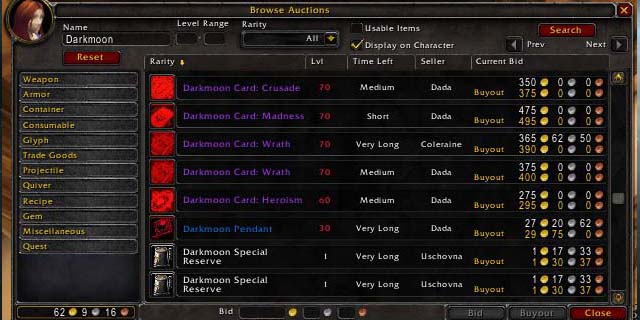
Developers approach this aspect with different attitudes entirely, especially when their in-game economy comes into contact with our real-world one. A game economy, like the real world, requires a continual exchange of items and wealth to continue existing. As such, items and currency must continually enter and leave circulation, or rampant inflation followed by a huge wealth division between veteran and new players will occur, as it will become incredibly difficult for a new player to obtain upgrades in an over-inflated economy.
- Items must always become unsellable or decay from the world.
- Game currency should leave the world at around the same rate it enters.
- Players must always need more items.
There are generally two philosophies among MMOs today, which generally follow either World of Warcraft or EVE Online‘s lead. Obviously, the WoW style is vastly more popular, as the majority of MMOs follow its example.
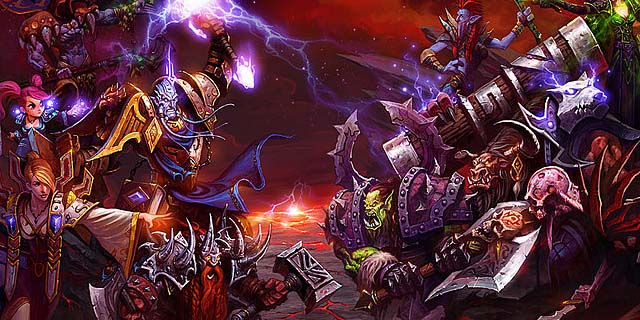
World of Warcraft
Generally, the economy of World of Warcraft is built around rare drops and crafting ingredients, and not equippable gear. Much of the equipment is bound to a player or account as soon as it’s picked up, and cannot be traded. There are quite a few things that are not bound until equipped, though this means only one player can use the item before it is discarded. This is important, as the game is based around keeping the same items indefinitely; equipment does not fully decay through use, and is not lost at death. This means that the binding restriction is necessary, or items would eventually lose all value over time as supply would outpace demand.
The other aspect at work here is game currency. World of Warcraft gold has always been plagued with inflation problems, often due to game exploits and real money transactions that occur outside of the control of the developer. Blizzard has had to introduce fairly restrictive measures regarding currency as a result, such as an hour delay in obtaining profits from the auction house, and large restrictions on trial accounts, as well as added customer service staff to investigate and remove accounts participating in real-money transactions. Another aspect that has arisen in the past couple years is being able to “hire” a guild to run you through a high-level raid area for loot and achievements.
World of Warcraft probably has one of the most controlled economies, restricting many items in the interests of fighting real money transactions and gold farming for profit.
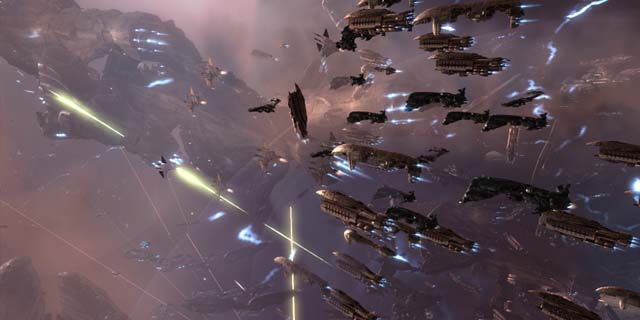
EVE Online
EVE Online is an odd sort of game that tailors itself to a certain type of player, and doesn’t change itself to attract anyone else. Unlike WoW, EVE is based around player-vs.-player competition. As far as complexity goes, if WoW is a medieval marketplace, EVE is Wall Street. Aside from ensuring a few basic items remain on the open marketplace for new players, EVE‘s economy is almost entirely run by its users. Every item available for sale can be crafted by its players and sold. There are rare items in EVE, though they are generally not used very often.
The basis behind this immense player-driven economy is EVE‘s death penalty. EVE is very punishing towards failure, as death means the loss of your ship and most attached items. Several items may survive, should you return to the spot you died to retrieve them. However, this means items leave the game world, which in turn increases their value. The other aspect – the part that makes EVE‘s economy so interesting – is that players can in effect play the market, simply buying and selling their way to a full wallet like a stock market trader. Now WoW does this too, as knowing when to buy low and sell high is something that exists in any economy, but in EVE, this is taken to an entirely new level.
EVE is split into several regions, each with its own economy and market system. You can only sell an item in the region it physically resides in, which leads to cargo hauling and trading becoming a viable path towards profit if you can find the right items to transport. The game’s PvP regions generally operate with no laws or controls; often run by player corporations and alliances, they typically operate on the basis of self-sufficiency and to survive, not to make profit. However, nothing is free, and only the biggest alliances can be wholly self-sufficient. Some of the rarest crafting materials, which in EVE are comprised of minerals mined from asteroids, are only available in areas prone to PvP, drastically increasing their value. These can be sold in the “safe” central area of the EVE galaxy for a large profit.
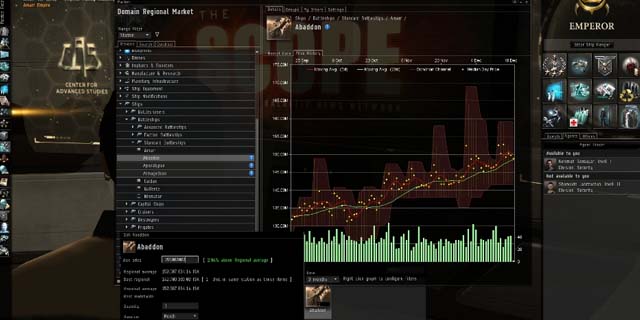
The currency of EVE is the Interstellar Kredit, or ISK. (A play on Icelandic Kroner, as CCP is based in Iceland). There are very few restrictions on game currency, as the vast majority of it is simply circulated between players. There are several ways it is removed from the economy, though one of the most interesting differences from WoW is how CCP has chosen to combat real-money transactions within their game.
CCP has taken a real “fighting fire with fire” approach to real money transactions, allowing players to trade money for ISK through in-game time, called PLEX (or Pilot License Extensions). CCP sells in-game PLEX items for about the same price as a month of game time. PLEX are traded like any other in-game item on the open market. A PLEX, once purchased, can be used to apply time to your game subscription, in place of paying for game-time. In effect, it isn’t earning CCP any more money, but simply generating it from different sources. They still get the same amount per account, but this allows those who would probably turn to an outside source of bought ISK to essentially pay another player’s subscription in exchange for in-game currency. This fights real-money transactions by decreasing the demand for purchased ISK, and as a result decreases the number of players abusing exploits to generate and sell it. It is an interesting approach to a problem endemic to the genre, and from what I can tell, the playerbase supports it. (Especially the veteran players who generate a lot of ISK each month, as it allows them to play for free.)
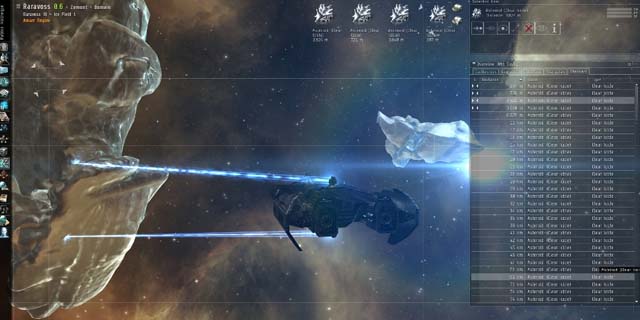
CCP is also one of the few companies taking a very proactive approach to their game economies, as the first company to bring an economist on staff to manage and maintain it. Recently, Valve has also done the same, having had similar success with Team Fortress 2‘s microtransaction-based free-to-play model, a prime example of how economy management has moved beyond simply being an aspect of running an MMO.
This can become one of the most difficult parts of game development – it’s something that even stress testing cannot truly test – as players will treat their in-game items differently knowing full well that a beta will be wiped once complete. Managing an economy well can be the difference between a ten-year game or a two-year game, and many players are unwilling to invest time and money into a game that looks like it is failing.



















